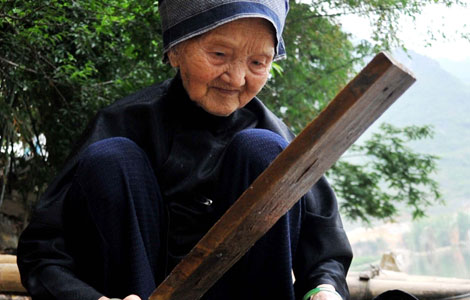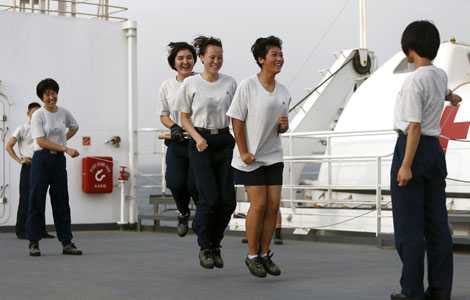Honoring the heroes of Songshan Mountain
Updated: 2013-09-04 09:46
By Hu Yongqi in Longling, Yunnan, and Hou Liqiang in Beijing (China Daily)
|
|||||||||||
Taking care of heroes
Fu Xinde is now the oldest CEF survivor and he was not able to attend Tuesday's ceremony due to injuries to his legs. The 112-year-old man fought against the Japanese army between 1928 and 1945, taking part in major battles at Changsha, capital of Hunan province, and Nanjing, then China's capital. In 1941, he rushed to assist the Chinese army in Longling.
In 1945, Fu retired but was unable to return to Henan province because he did not have the money for the journey. Instead, he resumed his career as a doctor, settling in the county, marrying and raising seven children.
On Tuesday, his son Fu Xianhui, 62, was at the ceremony on the mountain to represent his father. "When he was healthy and had no problem in hearing others, my father would tell stories from the war and how many soldiers he had saved as a military doctor at that time," Fu said.
In the 1960s, Fu Xinde was told by the local government to do farming work in the Songshan area. After this, he was unable to continue working as a doctor and instead became a construction worker. In the 1980s, the company he worked for went bankrupt and he found himself unemployed.
Starting from 2010, Fu received a pension of 1,000 yuan ($163) a month, and local authorities awarded him an annual subsidy of 2,400 yuan - the same given to soldiers who have retired from the Chinese People's Liberation Army.
"My father had some unfortunate experiences in those times, but for the past three years we have felt a caring attitude from the government. We don't really care how much money is given to him - it's just a sort of recognition," said Fu Xianhui's son.
In 2005, then-president Hu Jintao acknowledged the contribution of the National Revolutionary Army in fighting the Japanese invaders, and Fu Xinde's allowance is part of that recognition.
However, many other veterans from the Kuomintang army have not been so lucky, and have been told by local civil affairs bureaus that national policy has not yet translated into financial payments.
Fu Xiaofang, the youngest daughter of Duan Guojie, who commanded a regiment during the fighting at Songshan, said the contribution of the Chinese Expeditionary Force should be recognized, and all the soldiers of the Kuomintang should be treated as equal to others who had sacrificed their lives in fighting the Japanese invaders.
"Fortunately, I heard that the Ministry of Civil Affairs has promulgated a new policy to provide subsistence allowances to retired soldiers who fought during the World War II. That's something that made us happy, and we hope the policy will be implemented without hesitation," she said.
Liu Yiran contributed to the story.
Related Stories
CPC history in pictures (4): The War of Resistance against Japanese Aggression (1937-1945) 2011-08-22 15:56
War of Resistance against Japan 2011-05-10 12:59
Today's Top News
Energy partners boost
gas supplies
Police name attacker who took boy's eyes
Technology transfer is a focus
Japan urged to face history
Abe creates boogeyman to justify buildup
'Diamond decade' ahead for China, ASEAN
Syrian refugees exceed 2m
State asset head sacked from post
Hot Topics
Lunar probe , China growth forecasts, Emission rules get tougher, China seen through 'colored lens', International board,
Editor's Picks

|

|

|

|

|

|





